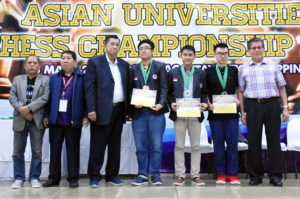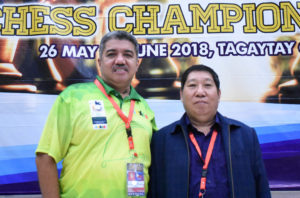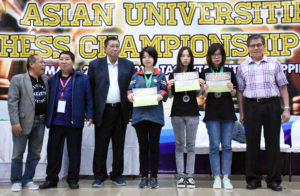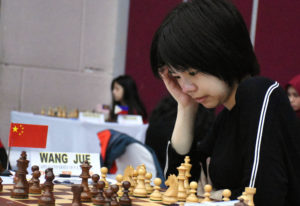Special Report By Ed Andaya
THE whole of Asia — and not only the host Philippines — is the biggest winner in the recently-concluded 2018 Asian Universities Chess Championships held at the Tagaytay International Convention Center last May 26-June 2.
And why Asia?
Let us count the way.
First, the AUCC 2018 produced an unlikely men’s champion in No. 8 seed FM Yoseph Theolifus Taher and underscored Indonesia’s dramatic rise back on top of Asian chess.
Second, China lived up to its high billing in the women’s division with a 1-2-3-4 finish led by top seed WGM Wang Jue.
And third, host Philippines unveiled the future with Istraelito Rilloraza, Mari Joseph Turqueza, Paulo Bersamina and John Marvin Miciano, who came up with respectable showings in the men’s division, and Bernadette Galas, Alphecca Gonzales, Kylen Joy Mordido and Shania Ma Mendoza, who finished in the Top 10 in the women’s side.
“Asian players need this kind of developmental tournaments to hone their skills and even test their strength by playing against one another. FIDE secretary-general Cong. Bambol Tolentino know the importance of hosting this tournament for young players in Asia,” said Asia’s first GM Eugene Torre.
“The players are already winners by participating in the AUCC. This is good for development of chess not only in the Philippines but in whole of Asia,” added Asian Chess Federation executive director Toti Abundo,
Men’s division


Indonesia – Champions. The Writer with the Chief Arbiter.
There were plenty of surprises in the 42-player men’s competition with the gods of chess finally smiling on Taher, one of four players under Indonesian coach-GM Susanto Megaranto.
A combination of Taher’s victory over No. 10 FM Jeevitesh Sai Agni of India and IM Syah Farid Firman over top seed IM Xu Yi of China did the trick for the Indonesians.
Taher, the 18-year-old student at Gunadarma University in Jakarta, finished the nine-round tournament with seven points on five wins and four draws.
Surprisingly enough, all his four draws came against the top two Chinese players — Xu and second seed IM Wang Chen — and the top two Filipinos — IM John Marvin Miciano and Paulo Bersamina.
Aside from the draws with these higher-rated players, Taher had razor-sharp games to cut down the rest of his opponents — No. 29 Takaya Noguchi of Japan in the first round, No. 17 Rilloraza in the second round, No. 14 Rhenzi Kyle Sevillano of the Philippines in the fifth round, No. 12 FM Ariz Abdul Hafiz on Indonesia in the eighth round and Sai Agni in the ninth and final round.
Xu, the highest-rated player in the field with an ELO of 2526, settled for runner-up honor with 6.5 points on five wins, three draws and one loss in the final round.
Xu actually finished in a three-way tie for second to fourth places with Muhammad Lufti Ali of Indonesia and IM Wang Chen of China, but clinched the silver medal by virtue of higher tiebreak score.
Ali edged Wang for the bronze to complete Indonesia’s 1-3 finish.
It was a heartbreaker for Xu.
The 20-year-old campaigner from Shanghai University of Finance and Economics led from the fourth round onwards. By round 7, he led the way with six points and by a full point over Taher and five other players.
But a draw and a loss to Indonesians Ali and Firman pulled him down and allowed Taher to snatch the gold.
The Filipinos also have reasons to smile.
Rilloraza, Turqueza, Bersamina, Miciano, CM John Merill Jacutina and Sevillano did not disappoint
Rilloraza, the 17-year-old student of UAAP champion Far Eastern University under GM Jayson Gonzales, swept his last three games to finish fifth overall with six points on six wins and three losses.
Turqueza, the pride of NCAA champion San Beda University, wound up ninth overall with six points, with all his five wins coming against fellow Filipinos.
Bersamina had 5.5 points, including 3/3 in the first three rounds; Miciano also had 5.5 points despite going 1/3 in the homestretch marred by a final-round setback to Ali; Jacutina had five points highlighted by a fighting draw with No. 3 seed Wang Yiye of China in the fourth round; and Sevillano had the same score of five ponts despute a final-round loss to Yiye.
Sai Agni, who represented Ismsnia University, was the highest-placed Indian player at No. 8 with 6/9.
Top scorer for Malaysia was No. 16 Yeap Eng Chiam, who finished in 11th place with 5.5/9.
Japan, Nepal and Pakistan also sent players.
Women’s division


China – Champion. Multiple Gold Winner WGM Wang Yue.
It was an all-China show in the women’s division.
But there’s no surprise there.
Top seed WGM Wang Jue did not relinquish the lead enroute to a runaway score 7.5 points on six wins and three draws.
Wang, a 23-year-old stunner from Capital University of PE and Sports in Beijing, swept her first three assignments with surprising ease.
The top-seeded Wang (ELO 2366) slowed down a bit with draws against fellow Chinese and No. 2 seed WIM Qiu Mengji and No. 8 seed Filipina Marie Antoinette San Diego before resuming her winning ways with three more victories.
A final-round draw by Wang with Galas sealed the half-point win over three other Chinese and one Filipina players.
After the tiebreak, it was Nie Xin, second; Liu Manli, third; Qiu Mengjie, fourth; and San Diego, fifth.
Gonzales was the biggest surprise.
A student of Ramon Durano Foundation-Danao, Gonzales more than held her own to finish sixth overall with 5.5 points.
The 21st-seeded Filipina had five wins, three losses and one draw. She lost two of her first three matches before coming back to win the next three, including one decisively against No. 10 seed Hu Yu of China.
India and Malaysia were the other top-performing countries.
No. 5 Sahajasri Choletti of India finished seventh with 5.5 points, while No. 12 WFM Azman Hisham Nur Nabila of Malaysia came in 11th with five points.
Blitz competitions
The results of the seven-round blitz tournaments held right before the awarding ceremony mirrored the outcome of the standard chess events with Taher and Wang also bagging the titles with 6.5/7.
Second and third placers in men’s blitz were Firman (6) and Xie Yu (5.5) of China.
In the distaff side, Nie Xin and Mengjie Qiu both had 5.5 points for second and third places.
Team championship
Led by Taher and Firman, Gunadarma University of Indonesia captured the overall title after winning all four gold medals in the men’s standard and blitz chess competitions.
Taher swept the gold medals in the standard competition with seven points in nine rounds and blitz event with 6.5 points in seven rounds.
Firman added a silver in blitz and Ali had a bronze in standard chess.
Two Chinese teams — Shanghai University of Finance and Economics and Capital University of PE and Sports — finished with two gold medals each both in the women’s category.
Shanghai University dominated the women’s competitions with two team golds, while WGM Wang Jue of Capital University swept the individual golds in standard and blitz with 7.5/9 and 6.5/7, respectively.
Shanghai also added four silvers and four bronzes to emerge as the winningest team with a total of 10 medals.
The Philippines finished fourth overall with two silvers in blitz and one bronze in standard chess of the event supported by the Philippine Sports Commission (PSC),headed by chairman William “Butch Ramirez.
UAAP champion Far Eastern University captured the bronze medal in standard chess with 16.5 points behind Istraelito Rilloraza (6), Miciano (5.5) and John Jacutina (5).
FEU also pocketed a gold medal in the junior division, while NCAA member Arellano University, handled by coach Rudy Ibanez settled for the silver.
Winning the silver blitz medals for the host nation are the national teams of Daniel Quizon, Sevillano and Bersamina in the men’s division and Venice Vicente, Marie Antoinette San Diego and Mendoza in the women’s category.
Mike Lapitan, who represented both FIDE secretary-general Cong. Abraham “Bambol” Tolentino and Tagaytay City Mayor Agnes Tolentino, awarded the trophies and medals to the winners.
He was assisted by Torre, Abundo, National Chess Federation of the Philippines (NCFP) officials Red Dumuk and Judge Gonzalo Mapili and chief arbiter Bong Bunawan of Indonesia.
As the curtains in Tagaytay came to a fitting close, Bunawan only had six words to all the participants: “See you in Bali next year.”
